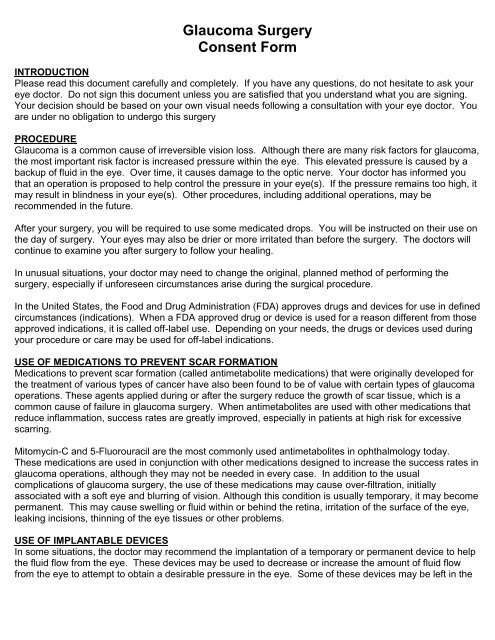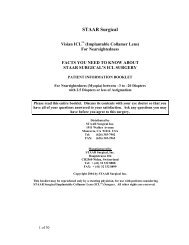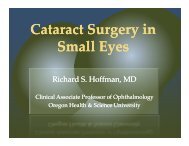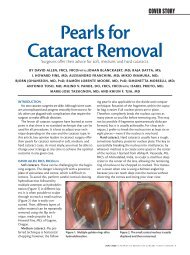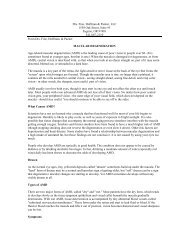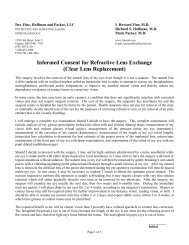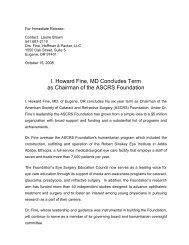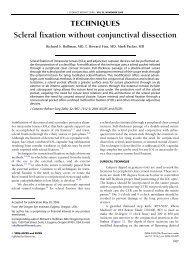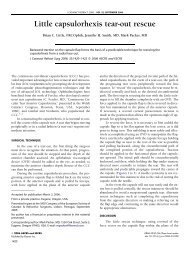Glaucoma Surgery Consent Form
Glaucoma Surgery Consent Form
Glaucoma Surgery Consent Form
You also want an ePaper? Increase the reach of your titles
YUMPU automatically turns print PDFs into web optimized ePapers that Google loves.
<strong>Glaucoma</strong> <strong>Surgery</strong><br />
<strong>Consent</strong> <strong>Form</strong><br />
INTRODUCTION<br />
Please read this document carefully and completely. If you have any questions, do not hesitate to ask your<br />
eye doctor. Do not sign this document unless you are satisfied that you understand what you are signing.<br />
Your decision should be based on your own visual needs following a consultation with your eye doctor. You<br />
are under no obligation to undergo this surgery<br />
PROCEDURE<br />
<strong>Glaucoma</strong> is a common cause of irreversible vision loss. Although there are many risk factors for glaucoma,<br />
the most important risk factor is increased pressure within the eye. This elevated pressure is caused by a<br />
backup of fluid in the eye. Over time, it causes damage to the optic nerve. Your doctor has informed you<br />
that an operation is proposed to help control the pressure in your eye(s). If the pressure remains too high, it<br />
may result in blindness in your eye(s). Other procedures, including additional operations, may be<br />
recommended in the future.<br />
After your surgery, you will be required to use some medicated drops. You will be instructed on their use on<br />
the day of surgery. Your eyes may also be drier or more irritated than before the surgery. The doctors will<br />
continue to examine you after surgery to follow your healing.<br />
In unusual situations, your doctor may need to change the original, planned method of performing the<br />
surgery, especially if unforeseen circumstances arise during the surgical procedure.<br />
In the United States, the Food and Drug Administration (FDA) approves drugs and devices for use in defined<br />
circumstances (indications). When a FDA approved drug or device is used for a reason different from those<br />
approved indications, it is called off-label use. Depending on your needs, the drugs or devices used during<br />
your procedure or care may be used for off-label indications.<br />
USE OF MEDICATIONS TO PREVENT SCAR FORMATION<br />
Medications to prevent scar formation (called antimetabolite medications) that were originally developed for<br />
the treatment of various types of cancer have also been found to be of value with certain types of glaucoma<br />
operations. These agents applied during or after the surgery reduce the growth of scar tissue, which is a<br />
common cause of failure in glaucoma surgery. When antimetabolites are used with other medications that<br />
reduce inflammation, success rates are greatly improved, especially in patients at high risk for excessive<br />
scarring.<br />
Mitomycin-C and 5-Fluorouracil are the most commonly used antimetabolites in ophthalmology today.<br />
These medications are used in conjunction with other medications designed to increase the success rates in<br />
glaucoma operations, although they may not be needed in every case. In addition to the usual<br />
complications of glaucoma surgery, the use of these medications may cause over-filtration, initially<br />
associated with a soft eye and blurring of vision. Although this condition is usually temporary, it may become<br />
permanent. This may cause swelling or fluid within or behind the retina, irritation of the surface of the eye,<br />
leaking incisions, thinning of the eye tissues or other problems.<br />
USE OF IMPLANTABLE DEVICES<br />
In some situations, the doctor may recommend the implantation of a temporary or permanent device to help<br />
the fluid flow from the eye. These devices may be used to decrease or increase the amount of fluid flow<br />
from the eye to attempt to obtain a desirable pressure in the eye. Some of these devices may be left in the
eye permanently or may require further intervention, such as suture removal. There may be complications<br />
associated with these devices such as too much filtration, inadequate filtration, infection or double vision.<br />
RISKS OR DISCOMFORTS<br />
Any surgical procedure carries potential risks. Complications associated with glaucoma surgery may<br />
include: hemorrhage (bleeding) in your eye, infection, closure of the drain, inflammation and retinal or<br />
choroidal detachment. Any of these can result in the loss of sight in the eye. A cataract may develop, and<br />
this may have to be removed at some future date. Sometimes the pressure in the eye becomes too low or<br />
too high and this may necessitate other treatments or operations. You may have to continue treating the<br />
eye with drops, ointments or oral medications, or the doctor may have to give injections of medications<br />
around the eye. Also, the pressure in your other eye may become elevated. If your surgery involves the<br />
creation of a drain in your eye, you may be able to feel the drain or sutures under your eyelid, which may<br />
cause a scratchy sensation. The sensation is generally helped by topical lubricants. Some of the<br />
complications, such as cataract formation, infection, or closure of the drain, may occur years after this<br />
operation.<br />
Complications due to anesthesia are possible, such as drug reactions or other problems. These<br />
complications may involve other parts of your body, including the possibility of brain damage or even death.<br />
Rarely, the optic nerve may be damaged, which can result in loss of sight. Since it is not possible to list<br />
every potential complication that may occur as a result of any surgery, this list is incomplete, and there may<br />
be risks associated with this surgery that are currently unknown.<br />
All patients, even those who have not had eye surgery, should wear safety glasses for situations where they<br />
may get stuck in the eye, but this is especially important if you have had previous eye surgery.<br />
Contact your doctor with any problems noticed after the surgery, such as an increase in pain, light<br />
sensitivity, loss of vision, or unusual mattering or discharge from the operative eye. Many complications are<br />
manageable if caught early. You are responsible for reporting any symptoms and making arrangements to<br />
be evaluated and are also responsible for the associated fees.<br />
BENEFITS<br />
Although the results of your surgery cannot be guaranteed, the expected benefit is improved fluid flow within<br />
the eye, which will help lower the eye pressure and slow or stop glaucoma-related vision loss. Specific<br />
results from this treatment cannot be guaranteed. Eye surgeries typically do not make your vision perfect in<br />
all situations.<br />
ALTERNATIVE TREATMENTS<br />
You may elect not to have this surgery. In this situation, normally your condition will stay the same or<br />
perhaps worsen over time. Non-surgical treatments such as eye drops or pills may be helpful in some<br />
situations. Sometimes a combination of methods may be necessary.<br />
CONSENT TO PERFORM THE SURGICAL PROCEDURE<br />
I have been given an opportunity to ask any questions concerning the surgery. My doctor and his/her staff<br />
have answered my questions. I understand I am able to receive a copy of this consent form. By signing this<br />
document, I am stating I have read this document and had explained to me the possible risks, complications<br />
and benefits associated with the surgery.<br />
I herby willingly give my consent to have Annette Sims, MD perform this surgery performed on:
My Right Eye My Left Eye Both My Eyes<br />
Patient Signature: __________________________ Date: _______________<br />
Printed Name of Patient: _____________________ Time: ___:___ a.m. / p.m. (circle one)<br />
Witness Signature: __________________________ Date: ______________<br />
Printed Name of Witness: _____________________


